
You will surely have heard of the Dovetail Stage positioning stage, popularly known as the XY Stage, which utilizes the Measure Scope microscope measuring tool and its drive construction?
is known as one of the technological superpowers of the world, and those of us who live here are surrounded by a great many products of superior quality. But, how is this superior quality maintained and created? Probably very few people have actually given it much thought.
The manufacturing workplace is supported by a great variety of precision technologies, including "measurement", which is the origin of the manufacture of physical objects. The microscopes and stages mentioned above are representative of these supporting technologies.
MIRUC OPTICAL CO., LTD, based in Tokyo’s Tama district, has continued to launch products onto the world’s markets, insisting on "Japanese craftsmanship", and always developing products from their own unique perspective.
MIRUC OPTICAL President Hiroaki Muramatsu was joined by Mr. Kanou from the company’s Design Department and Mr. Yamakita from the Manufacturing Department to talk to us about the company’s strengths and their thoughts on the Japanese "craftsmanship" in the manufacture of physical objects.
Interviewer: Matsumoto
Conducted on October 14th, 2011
A long selling product and the birth of a company policy–
The Measure Scope is an extremely long selling product that MIRUC OPTICAL has been selling since the company was founded. And within that story is the secret of the birth of MIRUC OPTICAL’s policy of never imitating others.
— Tell us about the beginnings of MIRUC OPTICAL Company Ltd.
Muramatsu : The company was founded in my father’s day. He was originally working in a company that dealt in stereoscopic microscopes and decided to go solo from there. Father was a very sincere person and felt he could not engage in any activity that would harm the business of a company that he was so indebted to. Based on this concept that he would never engage in any business that was the same as that of his former employer, he began to focus his energies in the field of monoscopic microscopes. Because father was a designer, I think he had a very strong feeling that he wanted to succeed with his own abilities, with his own ideas.
— How popular were monoscopic microscopes in those days?
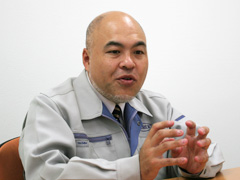
Mr.Muramatsu
Muramatsu : They are perhaps fairly widely used nowadays, but in order to achieve an erect image (where the vertical and horizontal orientation of the work is the same as when viewed through the lens) with a single lens, the prism used is extremely important.
My father collaborated with another company to develop and realize a microscope that was "monoscopic" and that could be used "easily" in the "workplace". Until then, there was no product available that could meet these needs. There were some extremely expensive microscopes being produced by a much bigger manufacturer, but they were not in the kinds of industrial fields that we are supplying to.
— What are differences between the monoscopic measure scope of those days and the products that are being sold now?
Muramatsu : There have been repeated minor changes over the years, and we have expanded our product lineup, but the feature of being able to make different combinations of basic parts and units is the same. From that perspective, these products may described as long sellers that have been going since the company was founded, 48 years ago.
— Was the dovetail stage also available at that time?
Muramatsu : Since the drive construction technology used is the same as used in microscopes, this can also be considered one of the basic elements and, therefore, a long selling product. In the present day, with the development of image recognition lenses and airpits, our product lineup has increased quite substantially. One product whose development and manufacture we are working particularly hard on, including the intellectual property rights, is the dovetail stage.
MIRUC-ism, passed down through the years–
One thing that MIRUC OPTICAL places great importance on is its intellectual property rights.
The term "intellectual property" generally conjures up images of companies with development power and capital power trying to protect their own technologies, perhaps even of trying to monopolize profit.
However, MIRUC OPTICAL has something of a unique stance.
Stemming from the policy of creating original products and not imitating anyone, the company expresses its stance on intellectual property with the phrase "Everything that we are involved in can be called intellectual property. It is that kind of manufacturing of physical objects that we should develop."
The company always talks of intellectual property as "added value", and "the continued delivery of added value products at a reasonable price" has been the "secret" of their continued success, and they seem to describe it as if it were their "mission".
— Has it been company policy from the beginning to try to obtain patents for your own development work?
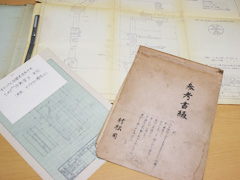
Muramatsu : My father neglected to obtain patents for the technologies that he developed himself. He always hated imitation of other people’s work, and this may have been part of the reason why the company did not grow. And what we have inherited from that is our policy of acquiring intellectual property rights. Once Mr. Kanou and I start talking about design, there is already a kind of common awareness between us.
Kanou : Even now when you look at the old drawings that were done by hand, they are all very carefully and minutely done. You can really get the feeling that the designs took appearance and the user into consideration, and insisted on originality. At the same time, this careful attention to detail is a kind of "corporate spirit" of the company that has been passed down through the years.
MIRUC quality continues to be refined and improved–
MIRUC OPTICAL still insists on "craftsmanship" in its manufacturing. However, craftsmanship also requires a kind of "sense" and the ability to understand the "vital points" of the work, which cannot always be taught in a manual. The sharing of an "ism" among those involved in manufacture, and the propagation of the quality built upon this "ism" may be said to be a kind of lifeline of companies that are involved in manufacture.
In terms of MIRUC OPTICAL’s strong points, the workplace leader’s comment "a half done job is no use" speaks volumes.
— How do you pass on the ‘ism’ of crafting a product carefully?
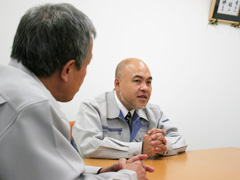
Muramatsu : Broadly speaking, there are two ways: when we release our products into the market as our company brand, and when we release then into the market as component parts.
In the case of the former, these products go out into the world carrying our brand, so we insist on 100% and more attention, and create our products without any compromise of "MIRUC quality" standards.
In the case of the latter, our focus is on what is most important to the customer. Is it price? Is it quality? Is it a positive compromise or a negative compromise? We believe it’s important for us to understand the customer’s real intention when they say something like "We only need such and such level of quality, and we want the price to reflect that."
We aim to provide products that will satisfy the customer’s demand 120%. Therefore, I think it is ego that brings out our "insistence" to the forefront.
— Which is the stronger impression, that "MIRUC quality" has been maintained from the company’s earliest days, or that it is something that you all have built up?
Muramatsu : The basic element is that which we have inherited from the company’s founder, I think. And then, we work to flesh that out.
I’ve felt that workplace leader Mr. Yamakita has had this kind of "sense" since joining the company. This "sense" is vitally important in this kind of work, and we refine it further by having an inquisitive mind. Our work advances by always testing ourselves. I believe that this kind of stance supports our "quality".
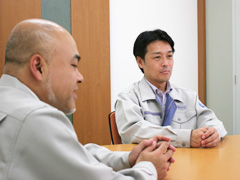
Yamakita : We place great importance on "craftsmanship", which is that part of the work that cannot be taught in a manual. It’s a sensory thing, a bit like learning to ride a bike, where at first you keep falling off and then gradually get the hang of it. It’s really difficult to teach that kind of thing to new employees. First we teach them, then we let them experience it, and then they go on to learn through trial and error. And gradually they get the hang of it. We teach the parts that can be explained technically, then step back a bit and let them get on with it, and then help them if there’s something they don’t understand. And that process is repeated over and over.
Muramatsu : It may seem that you can’t do this kind of work if you don’t have the right kind of sense, but what Mr. Yamakita was saying just now about the "attitude towards manufacturing physical" is also an extremely important element.
— Is there anything that you always pay special attention to in order to teach this kind of thing?
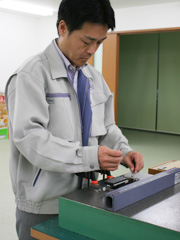
Mr.Yamakita
Yamakita : We believe that we ourselves are still developing, so when we have made something, we always have this kind of sense of pushing ourselves forward, to produce something that we can be even more proud of.
We don’t want to offer up a job that is only half done. We are always aware of what we believe is the best kind of product that we can make, so in the workplace we alert each other to anything we have noticed and work to improve quality overall. And that’s the kind of attitude that we bring to the work.
Muramatsu : When I watch Mr. Yamakita, I’m sometimes reminded of my father.
It may be in that feeling of not wanting to release a product that one is not satisfied with. Perhaps all craftsmen are the same in that they need to satisfy themselves. They want to release products that they are happy with. That kind of sense is very similar to my father’s.
— Do you ordinarily have technical study sessions in-house?
Muramatsu : We don’t have study sessions. What we do instead is continue the dialogue in our daily work. Whenever something happens, we feel it’s very important for everyone to get together at that time and talk it out. If we take away the barriers between sections and discuss things together, there are going to be areas where Design and Assembly (Manufacturing) don’t see eye to eye, but these things lead to the design of the next product.
"Development strength" proof of the company’s attitude towards the manufacture of physical objects–
The products and systems delivered by MIRUC OPTICAL are developed from a unique perspective and many of them are very characteristic. Many small and medium sized enterprises cannot afford to set up independent development sections, and MIRUC OPTICAL is no exception. In spite of this, how is it that they are able to continue to launch new products? The secret is in the relationships of mutual respect that exist within the company.
— Do you conduct market research on a daily basis?
Muramatsu : We are constantly conducting market research. We put out our feelers and organise our ideas and customers’ voices and then discuss them with Design. Very often, a development project starts from this kind of discussion of potential ideas for products.
— When you are asked for your opinions, what kind of awareness do you bring from the design perspective?
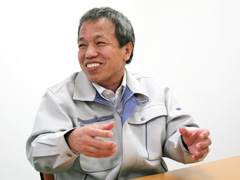
Mr.Kanou
Kanou : We all have our own thoughts and ideas, so sometimes we disagree, sometimes we agree, and sometimes we get a whole lot of new ideas, but we always try to come out straight with what we’re thinking. I’m proud of what I bring to the table as a person who works in design, but the President gives us his thoughts from the broader perspective of management, so sometimes I’m able to realize something completely new. There is an immeasurable sense of joy when, at a stroke, an idea is finely honed thanks to the synergy of the skillful mutual reflection of each other’s thoughts.
Muramatsu : Whenever I field an idea, they always have an awareness of the theme I’ve presented and gather a whole lot of things for our reference, buying things from home centers or collecting newspaper articles, etc., across a wide range of topics. And it’s very often the case that the idea for a new development project will be sparked from this process.
— So, this exchange of ideas results in the idea for a new product, and then it’s handed over to the manufacturing side?
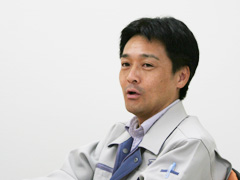
Mr.Yamakita
Yamakita : Manufacturing don’t often comment on new products, but with regard to current products they are always coming forward with opinions on how improvements could be made. At some point in the future, it would be nice to be able to develop a skillful approach to new products from the perspective of manufacturing also, but for the time being I feel that their role is to put together ideas on how to improve work efficiency while increasing quality.
Kanou : We’re not a company that wins on the strength of its sales force, so if we stop innovating, we’re not going to be able to continue to provide our customers with products that will satisfy them.
I believe that the ultimate in manufacturing is to create products that people are willing to stand in line to buy, like the iPhone, etc. And I believe that that kind of product creation is the ideal, and is our mission. For that reason, I think that the only thing we can tackle is "ideas". How can we get people to line up to buy our products? What kinds of concepts do we need? I think the best thing for us to do is to be thinking about these kinds of things on a day by day basis.
Muramatsu : Our products belong in the field of industry, but the opinions and ideas of women are also important. Sometimes they have ideas that come from a different perspective from us, and lead to the development of new products. The abilities of our female staff are extremely important to MIRUC quality.
Pride in "Made in Japan"–
In recent times, a great many opinions have been voiced about the brand "Made in Japan". A lot of media reports and the like in Japan talk about it as if it were some past glory of days gone by.
MIRUC President Muramatsu has doubts about today’s industrial scene, where the prices of foreign manufacturing are prized more highly than the superior quality of Japanese made products. For President Muramatsu, who says that" it all depends on the approach you take", "Made in Japan" is a matter of pride as well as brand.
— For most ordinary people, the term "Made in Japan" has a kind of brand image. When we see a product that has been well made with particular attention to something, we have a renewed sense of the high quality of Japanese products.
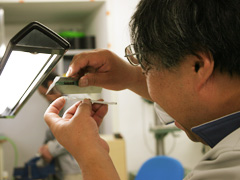
Muramatsu : In addition to the so-called hollowing out of industry, the high yen exchange rate and falling global share prices, we have electrical power and import duties issues, and the newspapers up in arms about FTA and TPP, etc. The manufacture of physical objects in Japan is now really suffering. And the shifting of production to overseas factories has become an all too familiar story. Even with all this going on, we feel that Made in Japan has not lost any of its value. Whether it loses its value or not depends on the approach you take.
At the same time, under the current circumstances, it is vitally important for us to have engineers that have an interest in and a passion for manufacturing. I hope that we will see people with real passion for manufacturing coming forth, and that they will join MIRUC OPTICAL in bolstering Japanese manufacturing.
"From Tama to the world" Tama companies with their sights set on global markets–
In fact, throughout Japan a number of regions are creating strong "manufacturing" networks. There are many instances that renew the feeling that it is this kind of initiative that is the strength of Japan as a technological superpower.
And throughout Tama district, where MIRUC OPTICAL is based, many "industry" initiatives are being planned.
— Do you have much technological exchange with other companies in the same industry?
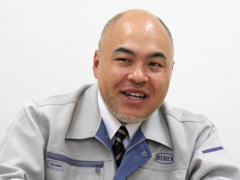
Muramatsui : Yes, we have some exchange with other companies in our industry. But, a lot of the exchange takes place within the context of organizations set up to provide backup for businesses in Tama district. In these organizations, regardless of what each other’s business is, we willingly exchange our know-how.
Our company started off in the Suginami area of Tokyo. At a time when it looked as if we might be forced out of business, we relocated here to Hachioji. Looking back, I think it was a very good thing for us that we came to Tama district.
Also, the city government is undertaking the "Tama Silicon Valley Project", which aims to develop Tama district as a concentration of clusters of Japanese industry, and this is also supporting us.
There are many companies in Tama district that are involved in "measurement", and that is something of a keyword for these companies. The district is also putting a lot of effort into developing the linkage between industry and education, with many projects attempting to link university research with corporate research and development.
The "Chain of Passion" is MIRUC OPTICAL’s strength Passion–
There has been a common thread running through the comments that we have heard.
Even though they are ordinarily dealing with different kinds of work and have different perspectives, we found that everyone shares a pride in their work and a passion for working here. And we also felt this from the administrative staff who received us when we came to do the interview. We’ve heard and understood about the company’s technological and development strengths, but MIRUC OPTICAL’s greatest strength might in fact be this sense of "passion".
— Is there any particular thing that you normally keep in mind as you do your work?
Muramatsu : Well, from a management perspective, I’d like everyone, no matter who they are, to enjoy doing their work. It is really tough to work feeling that you are struggling to meet your quota day in day out. I don’t value working in this way, but rather the thoughts that are generated from inside.
Of course, work is sometimes difficult, but I want everyone to enjoy their work.
I don’t want to use fancy terms like "reason to work" or "reason to live", but I do feel strongly that, in that sense, I want to make MIRUC OPTICAL a company that is just that little bit different from the others.
— Please tell us what you value particularly.
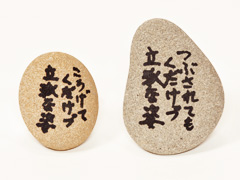
Muramatsu : MIRUC OPTICAL is now in its 48th year, counting from the year it was founded.
Our 50th anniversary is coming up in the year after next, and that will be an important milestone for us. It’s very difficult for a company to stay in business for half a century, and I feel we want to expand our vision even further. So, for that purpose, I want to bring young strength, new strength, in the form of our human resources, into the company so that we can grow together. So this means that, if we don’t have "passion", the company cannot develop and grow.
First of all, there’s management passion. Then there’s the passion of the developers as they struggle to resolve the issues that crop up day by day. And then there’s the passion for making things, which is necessary when we reach the stage of bringing prototypes into production. I believe that the fusion of these different types of passion is what really makes MIRUC OPTICAL.
— Finally, what is the origin of your company’s name?
Muramatsu : The MIRUC part of MIRUC OPTICAL is pronounced "mirak" and is composed of the English words "mirror", which is a basic element of optics, "miracle" and "luck"! The name was chosen to reflect our wish to be the kind of company that creates products that bring about amazing things and happiness to our customers, business partners and employees.
— Thank you very much for talking to us today.
Afterword The President’s respectful way of addressing his employees
When we think of the president of a manufacturing company, I believe many people share the image of a person who is tough, stubborn and obstinate.
However, when we first met President Muramatsu at MIRUC OPTICAL, our impression was of a polite, gentle person. In particular, the polite way in which he speaks to his employees reinforces this impression.
During our visit we were able to witness the relationships forged as a result of mutual respect for each person’s technology, ability and skill, and an awareness that transcends job remits. President Muramatsu is often saying "Thank you" to his employees, and this is surely due to the fact that he treats each one as important, and continues to feel grateful towards them. And this, too, is surely one of MIRUC OPTICAL’s secrets.

You will surely have heard of the Dovetail Stage positioning stage, popularly known as the XY Stage, which utilizes the Measure Scope microscope measuring tool and its drive construction?
is known as one of the technological superpowers of the world, and those of us who live here are surrounded by a great many products of superior quality. But, how is this superior quality maintained and created? Probably very few people have actually given it much thought.
The manufacturing workplace is supported by a great variety of precision technologies, including "measurement", which is the origin of the manufacture of physical objects. The microscopes and stages mentioned above are representative of these supporting technologies.
MIRUC OPTICAL CO., LTD, based in Tokyo’s Tama district, has continued to launch products onto the world’s markets, insisting on "Japanese craftsmanship", and always developing products from their own unique perspective.
MIRUC OPTICAL President Hiroaki Muramatsu was joined by Mr. Kanou from the company’s Design Department and Mr. Yamakita from the Manufacturing Department to talk to us about the company’s strengths and their thoughts on the Japanese "craftsmanship" in the manufacture of physical objects.
Interviewer: Matsumoto
Conducted on October 14th, 2011
A long selling product and the birth of a company policy–
The Measure Scope is an extremely long selling product that MIRUC OPTICAL has been selling since the company was founded. And within that story is the secret of the birth of MIRUC OPTICAL’s policy of never imitating others.
— Tell us about the beginnings of MIRUC OPTICAL Company Ltd.
Muramatsu : The company was founded in my father’s day. He was originally working in a company that dealt in stereoscopic microscopes and decided to go solo from there. Father was a very sincere person and felt he could not engage in any activity that would harm the business of a company that he was so indebted to. Based on this concept that he would never engage in any business that was the same as that of his former employer, he began to focus his energies in the field of monoscopic microscopes. Because father was a designer, I think he had a very strong feeling that he wanted to succeed with his own abilities, with his own ideas.
— How popular were monoscopic microscopes in those days?

Mr.Muramatsu
Muramatsu : They are perhaps fairly widely used nowadays, but in order to achieve an erect image (where the vertical and horizontal orientation of the work is the same as when viewed through the lens) with a single lens, the prism used is extremely important.
My father collaborated with another company to develop and realize a microscope that was "monoscopic" and that could be used "easily" in the "workplace". Until then, there was no product available that could meet these needs. There were some extremely expensive microscopes being produced by a much bigger manufacturer, but they were not in the kinds of industrial fields that we are supplying to.
— What are differences between the monoscopic measure scope of those days and the products that are being sold now?
Muramatsu : There have been repeated minor changes over the years, and we have expanded our product lineup, but the feature of being able to make different combinations of basic parts and units is the same. From that perspective, these products may described as long sellers that have been going since the company was founded, 48 years ago.
— Was the dovetail stage also available at that time?
Muramatsu : Since the drive construction technology used is the same as used in microscopes, this can also be considered one of the basic elements and, therefore, a long selling product. In the present day, with the development of image recognition lenses and airpits, our product lineup has increased quite substantially. One product whose development and manufacture we are working particularly hard on, including the intellectual property rights, is the dovetail stage.
MIRUC-ism, passed down through the years–
One thing that MIRUC OPTICAL places great importance on is its intellectual property rights.
The term "intellectual property" generally conjures up images of companies with development power and capital power trying to protect their own technologies, perhaps even of trying to monopolize profit.
However, MIRUC OPTICAL has something of a unique stance.
Stemming from the policy of creating original products and not imitating anyone, the company expresses its stance on intellectual property with the phrase "Everything that we are involved in can be called intellectual property. It is that kind of manufacturing of physical objects that we should develop."
The company always talks of intellectual property as "added value", and "the continued delivery of added value products at a reasonable price" has been the "secret" of their continued success, and they seem to describe it as if it were their "mission".
— Has it been company policy from the beginning to try to obtain patents for your own development work?

Muramatsu : My father neglected to obtain patents for the technologies that he developed himself. He always hated imitation of other people’s work, and this may have been part of the reason why the company did not grow. And what we have inherited from that is our policy of acquiring intellectual property rights. Once Mr. Kanou and I start talking about design, there is already a kind of common awareness between us.
Kanou : Even now when you look at the old drawings that were done by hand, they are all very carefully and minutely done. You can really get the feeling that the designs took appearance and the user into consideration, and insisted on originality. At the same time, this careful attention to detail is a kind of "corporate spirit" of the company that has been passed down through the years.
MIRUC quality continues to be refined and improved–
MIRUC OPTICAL still insists on "craftsmanship" in its manufacturing. However, craftsmanship also requires a kind of "sense" and the ability to understand the "vital points" of the work, which cannot always be taught in a manual. The sharing of an "ism" among those involved in manufacture, and the propagation of the quality built upon this "ism" may be said to be a kind of lifeline of companies that are involved in manufacture.
In terms of MIRUC OPTICAL’s strong points, the workplace leader’s comment "a half done job is no use" speaks volumes.
— How do you pass on the ‘ism’ of crafting a product carefully?

Muramatsu : Broadly speaking, there are two ways: when we release our products into the market as our company brand, and when we release then into the market as component parts.
In the case of the former, these products go out into the world carrying our brand, so we insist on 100% and more attention, and create our products without any compromise of "MIRUC quality" standards.
In the case of the latter, our focus is on what is most important to the customer. Is it price? Is it quality? Is it a positive compromise or a negative compromise? We believe it’s important for us to understand the customer’s real intention when they say something like "We only need such and such level of quality, and we want the price to reflect that."
We aim to provide products that will satisfy the customer’s demand 120%. Therefore, I think it is ego that brings out our "insistence" to the forefront.
— Which is the stronger impression, that "MIRUC quality" has been maintained from the company’s earliest days, or that it is something that you all have built up?
Muramatsu : The basic element is that which we have inherited from the company’s founder, I think. And then, we work to flesh that out.
I’ve felt that workplace leader Mr. Yamakita has had this kind of "sense" since joining the company. This "sense" is vitally important in this kind of work, and we refine it further by having an inquisitive mind. Our work advances by always testing ourselves. I believe that this kind of stance supports our "quality".

Yamakita : We place great importance on "craftsmanship", which is that part of the work that cannot be taught in a manual. It’s a sensory thing, a bit like learning to ride a bike, where at first you keep falling off and then gradually get the hang of it. It’s really difficult to teach that kind of thing to new employees. First we teach them, then we let them experience it, and then they go on to learn through trial and error. And gradually they get the hang of it. We teach the parts that can be explained technically, then step back a bit and let them get on with it, and then help them if there’s something they don’t understand. And that process is repeated over and over.
Muramatsu : It may seem that you can’t do this kind of work if you don’t have the right kind of sense, but what Mr. Yamakita was saying just now about the "attitude towards manufacturing physical" is also an extremely important element.
— Is there anything that you always pay special attention to in order to teach this kind of thing?

Mr.Yamakita
Yamakita : We believe that we ourselves are still developing, so when we have made something, we always have this kind of sense of pushing ourselves forward, to produce something that we can be even more proud of.
We don’t want to offer up a job that is only half done. We are always aware of what we believe is the best kind of product that we can make, so in the workplace we alert each other to anything we have noticed and work to improve quality overall. And that’s the kind of attitude that we bring to the work.
Muramatsu : When I watch Mr. Yamakita, I’m sometimes reminded of my father.
It may be in that feeling of not wanting to release a product that one is not satisfied with. Perhaps all craftsmen are the same in that they need to satisfy themselves. They want to release products that they are happy with. That kind of sense is very similar to my father’s.
— Do you ordinarily have technical study sessions in-house?
Muramatsu : We don’t have study sessions. What we do instead is continue the dialogue in our daily work. Whenever something happens, we feel it’s very important for everyone to get together at that time and talk it out. If we take away the barriers between sections and discuss things together, there are going to be areas where Design and Assembly (Manufacturing) don’t see eye to eye, but these things lead to the design of the next product.
"Development strength" proof of the company’s attitude towards the manufacture of physical objects–
The products and systems delivered by MIRUC OPTICAL are developed from a unique perspective and many of them are very characteristic. Many small and medium sized enterprises cannot afford to set up independent development sections, and MIRUC OPTICAL is no exception. In spite of this, how is it that they are able to continue to launch new products? The secret is in the relationships of mutual respect that exist within the company.
— Do you conduct market research on a daily basis?
Muramatsu : We are constantly conducting market research. We put out our feelers and organise our ideas and customers’ voices and then discuss them with Design. Very often, a development project starts from this kind of discussion of potential ideas for products.
— When you are asked for your opinions, what kind of awareness do you bring from the design perspective?

Mr.Kanou
Kanou : We all have our own thoughts and ideas, so sometimes we disagree, sometimes we agree, and sometimes we get a whole lot of new ideas, but we always try to come out straight with what we’re thinking. I’m proud of what I bring to the table as a person who works in design, but the President gives us his thoughts from the broader perspective of management, so sometimes I’m able to realize something completely new. There is an immeasurable sense of joy when, at a stroke, an idea is finely honed thanks to the synergy of the skillful mutual reflection of each other’s thoughts.
Muramatsu : Whenever I field an idea, they always have an awareness of the theme I’ve presented and gather a whole lot of things for our reference, buying things from home centers or collecting newspaper articles, etc., across a wide range of topics. And it’s very often the case that the idea for a new development project will be sparked from this process.
— So, this exchange of ideas results in the idea for a new product, and then it’s handed over to the manufacturing side?

Mr.Yamakita
Yamakita : Manufacturing don’t often comment on new products, but with regard to current products they are always coming forward with opinions on how improvements could be made. At some point in the future, it would be nice to be able to develop a skillful approach to new products from the perspective of manufacturing also, but for the time being I feel that their role is to put together ideas on how to improve work efficiency while increasing quality.
Kanou : We’re not a company that wins on the strength of its sales force, so if we stop innovating, we’re not going to be able to continue to provide our customers with products that will satisfy them.
I believe that the ultimate in manufacturing is to create products that people are willing to stand in line to buy, like the iPhone, etc. And I believe that that kind of product creation is the ideal, and is our mission. For that reason, I think that the only thing we can tackle is "ideas". How can we get people to line up to buy our products? What kinds of concepts do we need? I think the best thing for us to do is to be thinking about these kinds of things on a day by day basis.
Muramatsu : Our products belong in the field of industry, but the opinions and ideas of women are also important. Sometimes they have ideas that come from a different perspective from us, and lead to the development of new products. The abilities of our female staff are extremely important to MIRUC quality.
Pride in "Made in Japan"–
In recent times, a great many opinions have been voiced about the brand "Made in Japan". A lot of media reports and the like in Japan talk about it as if it were some past glory of days gone by.
MIRUC President Muramatsu has doubts about today’s industrial scene, where the prices of foreign manufacturing are prized more highly than the superior quality of Japanese made products. For President Muramatsu, who says that" it all depends on the approach you take", "Made in Japan" is a matter of pride as well as brand.
— For most ordinary people, the term "Made in Japan" has a kind of brand image. When we see a product that has been well made with particular attention to something, we have a renewed sense of the high quality of Japanese products.

Muramatsu : In addition to the so-called hollowing out of industry, the high yen exchange rate and falling global share prices, we have electrical power and import duties issues, and the newspapers up in arms about FTA and TPP, etc. The manufacture of physical objects in Japan is now really suffering. And the shifting of production to overseas factories has become an all too familiar story. Even with all this going on, we feel that Made in Japan has not lost any of its value. Whether it loses its value or not depends on the approach you take.
At the same time, under the current circumstances, it is vitally important for us to have engineers that have an interest in and a passion for manufacturing. I hope that we will see people with real passion for manufacturing coming forth, and that they will join MIRUC OPTICAL in bolstering Japanese manufacturing.
"From Tama to the world" Tama companies with their sights set on global markets–
In fact, throughout Japan a number of regions are creating strong "manufacturing" networks. There are many instances that renew the feeling that it is this kind of initiative that is the strength of Japan as a technological superpower.
And throughout Tama district, where MIRUC OPTICAL is based, many "industry" initiatives are being planned.
— Do you have much technological exchange with other companies in the same industry?

Muramatsui : Yes, we have some exchange with other companies in our industry. But, a lot of the exchange takes place within the context of organizations set up to provide backup for businesses in Tama district. In these organizations, regardless of what each other’s business is, we willingly exchange our know-how.
Our company started off in the Suginami area of Tokyo. At a time when it looked as if we might be forced out of business, we relocated here to Hachioji. Looking back, I think it was a very good thing for us that we came to Tama district.
Also, the city government is undertaking the "Tama Silicon Valley Project", which aims to develop Tama district as a concentration of clusters of Japanese industry, and this is also supporting us.
There are many companies in Tama district that are involved in "measurement", and that is something of a keyword for these companies. The district is also putting a lot of effort into developing the linkage between industry and education, with many projects attempting to link university research with corporate research and development.
The "Chain of Passion" is MIRUC OPTICAL’s strength Passion–
There has been a common thread running through the comments that we have heard.
Even though they are ordinarily dealing with different kinds of work and have different perspectives, we found that everyone shares a pride in their work and a passion for working here. And we also felt this from the administrative staff who received us when we came to do the interview. We’ve heard and understood about the company’s technological and development strengths, but MIRUC OPTICAL’s greatest strength might in fact be this sense of "passion".
— Is there any particular thing that you normally keep in mind as you do your work?
Muramatsu : Well, from a management perspective, I’d like everyone, no matter who they are, to enjoy doing their work. It is really tough to work feeling that you are struggling to meet your quota day in day out. I don’t value working in this way, but rather the thoughts that are generated from inside.
Of course, work is sometimes difficult, but I want everyone to enjoy their work.
I don’t want to use fancy terms like "reason to work" or "reason to live", but I do feel strongly that, in that sense, I want to make MIRUC OPTICAL a company that is just that little bit different from the others.
— Please tell us what you value particularly.

Muramatsu : MIRUC OPTICAL is now in its 48th year, counting from the year it was founded.
Our 50th anniversary is coming up in the year after next, and that will be an important milestone for us. It’s very difficult for a company to stay in business for half a century, and I feel we want to expand our vision even further. So, for that purpose, I want to bring young strength, new strength, in the form of our human resources, into the company so that we can grow together. So this means that, if we don’t have "passion", the company cannot develop and grow.
First of all, there’s management passion. Then there’s the passion of the developers as they struggle to resolve the issues that crop up day by day. And then there’s the passion for making things, which is necessary when we reach the stage of bringing prototypes into production. I believe that the fusion of these different types of passion is what really makes MIRUC OPTICAL.
— Finally, what is the origin of your company’s name?
Muramatsu : The MIRUC part of MIRUC OPTICAL is pronounced "mirak" and is composed of the English words "mirror", which is a basic element of optics, "miracle" and "luck"! The name was chosen to reflect our wish to be the kind of company that creates products that bring about amazing things and happiness to our customers, business partners and employees.
— Thank you very much for talking to us today.
Afterword The President’s respectful way of addressing his employees
When we think of the president of a manufacturing company, I believe many people share the image of a person who is tough, stubborn and obstinate.
However, when we first met President Muramatsu at MIRUC OPTICAL, our impression was of a polite, gentle person. In particular, the polite way in which he speaks to his employees reinforces this impression.
During our visit we were able to witness the relationships forged as a result of mutual respect for each person’s technology, ability and skill, and an awareness that transcends job remits. President Muramatsu is often saying "Thank you" to his employees, and this is surely due to the fact that he treats each one as important, and continues to feel grateful towards them. And this, too, is surely one of MIRUC OPTICAL’s secrets.